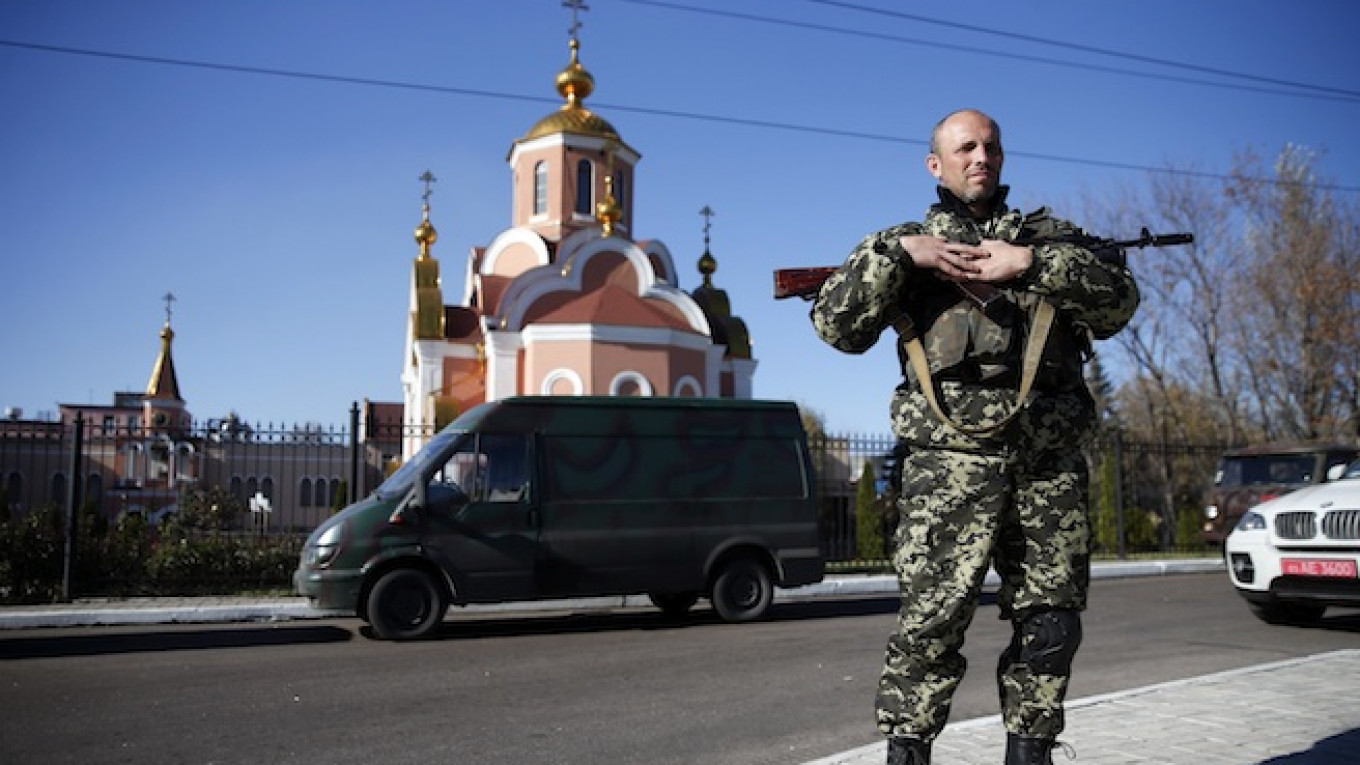KIEV/DONETSK — Kiev has accused separatists of preparing for renewed conflict in east Ukraine by bringing in "Russian mercenaries" and rearming as heavy shelling increased strains on a crumbling cease-fire.
In Berlin, the European Union's foreign affairs chief said Tuesday that the bloc's foreign ministers would discuss new punitive measures against Russia next week, but German Chancellor Angela Merkel ruled out further economic sanctions for now.
Shelling around Donetsk, the main rebel stronghold, and artillery exchanges elsewhere punctured a truce that has been violated by what Kiev says are armed Russian incursions, and what the rebels call a new offensive by government forces.
"Russian mercenaries are strengthening and reinforcing [rebel] forces near the front line," Ukrainian military spokesman Andriy Lysenko told a news briefing in Kiev on Tuesday.
He said the rebels had beefed up positions around the port city of Mariupol in the southeast, control of which would open up roads to territory in southern Ukraine that some Western leaders say Russian President Vladimir Putin hopes to claim.
NATO Concern
The cease-fire agreed on Sept. 5 was intended to end a conflict that has killed more than 4,000 people since the separatists rose up in the mainly Russian-speaking east against the Western-looking government in Kiev.
It has been unravelling quickly since separatist leaders were chosen in an election on Nov. 2 which the West said was illegitimate because it violated the terms of the truce.
In what has become the worst standoff between Moscow and the West since the Cold War, Lysenko said the rebels had received new ammunition, equipment and personnel in the past few days.
German Foreign Minister Frank-Walter Steinmeier warned in Berlin against "a return to a situation of two or three months ago with violent clashes and daily killings."
NATO's supreme allied commander, U.S. Air Force General Philip Breedlove, also expressed concern about the rebel build-up and criticized several close air, land and sea encounters between Russian and NATO forces in the last few weeks.
"In the air those interactions have multiplied, by some accounts, as many as three times … We now see larger [Russian] forces participating, as opposed to one or two bombers in the past," he said at a NATO base near Naples.
Troop and Tank Movements
Russia has denied providing the rebels with military support in a conflict it says was instigated by the West to keep Russia in check on the world stage, but NATO says there is overwhelming evidence it has sent in troops and weapons.
Kiev says a column of tanks and truckloads of troops crossed into east Ukraine from Russia last Thursday and officials from the Organization for Security and Cooperation (OSCE), a body that includes Russia, Ukraine, the U.S. and Western European countries, have spotted armored columns moving in the past few days.
A correspondent saw a convoy of about 50 military trucks without insignia on Tuesday carrying equipment such as artillery guns and missile-launchers near Makiivka, on the eastern outskirts of Donetsk. The OCSE also reported a sighting of what appeared to be the same convoy.
The U.S. and EU started imposing economic sanctions on Moscow in response to Russia's seizure of the Crimean peninsula from Ukraine in March, a month after the overthrow of a Moscow-backed president in Kiev following street protests.
The sanctions have deepened an economic slowdown in Russia, and the ruble has lost nearly 30 percent of its value against the dollar this year, but support for Putin is high in Russia and he has not softened his policy on Ukraine.
Alarm is growing in the West at what is increasingly seen as attempts by Putin to keep eastern Ukraine in Moscow's sphere of influence and bloc Kiev's campaign to join Europe's mainstream.
But Merkel, who leads the EU's most powerful nation, said she opposed anything stronger than an extension to EU travel bans on newly-elected separatist officials when the bloc's foreign ministers meet in Brussels next week.
"Beyond that, further economic sanctions are not planned at the moment, we are focusing on the winter and the humanitarian situation there and how to get a real cease-fire," she said.
EU foreign affairs chief Federica Mogherini said the ministers would also discuss increased support for Ukraine, which is near bankruptcy, dependent on international loans and deeply in debt to Russia for natural gas.
A Message from The Moscow Times:
Dear readers,
We are facing unprecedented challenges. Russia's Prosecutor General's Office has designated The Moscow Times as an "undesirable" organization, criminalizing our work and putting our staff at risk of prosecution. This follows our earlier unjust labeling as a "foreign agent."
These actions are direct attempts to silence independent journalism in Russia. The authorities claim our work "discredits the decisions of the Russian leadership." We see things differently: we strive to provide accurate, unbiased reporting on Russia.
We, the journalists of The Moscow Times, refuse to be silenced. But to continue our work, we need your help.
Your support, no matter how small, makes a world of difference. If you can, please support us monthly starting from just $2. It's quick to set up, and every contribution makes a significant impact.
By supporting The Moscow Times, you're defending open, independent journalism in the face of repression. Thank you for standing with us.
Remind me later.






